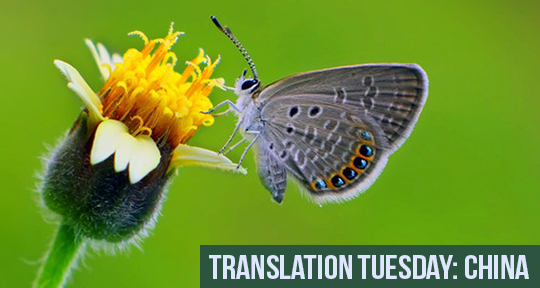This Translation Tuesday, we feature three poems by the Lu Xun Literary Prize-winning writer Chen Xianfa. Chen’s meditative poems often begin from the plain contemplation of a minute object—a butterfly, the rain, an earthworm—only to draw them into a larger field of philosophical ideas where language and nature’s presumed certainties are interrogated. Reflecting on her translation of these poems, Romaine Scott emphasises “the process of dissolving linguistic and cultural borders to arrive at The Third Shore,” invoking Yang Lian’s notion of translation as forging a new element. So too does Chen write: “There is no such thing as an expression set in stone,” observing a word’s numerous metamorphoses. Immerse yourself in the sparse beauty of Chen’s poems where even a speck of the world can be made anew.
Lanruo Temple
The safest place for a butterfly to exist is in the word ‘butterfly’
There is no such thing as an expression set in stone
Nor can I speak unequivocally of a gust of wind
and though the temple may be built upon a speck
of dust, it will, nonetheless, collapse from within
There are moments when a butterfly is motionless
‘To live’ requires fewer strokes of the pen than ‘to take wing’
Taking Shelter From the Rain
It’s raining. In the square many people are running about blindly
a piece of clothing held over their heads
Of course, they are not actually blind
their eyes are simply fixed on taking shelter from the rain
Before the square was built, this was a shantytown
beneath whose poor-quality
bitumen roofs
the smell of poverty, excitement and rebellion rubbed shoulders
with the tavern’s moon. Heaven knows how many nights we
toasted each other READ MORE…


